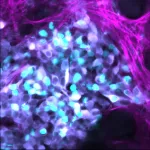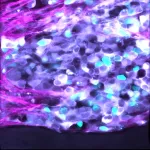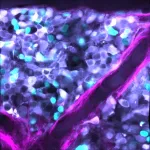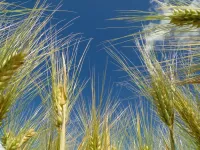(Press-News.org) Cancer cells have an innate randomness in their ability to respond to chemotherapy, which is another tool in their arsenal of resisting treatment, new research led by the Garvan Institute of Medical Research shows.
Understanding why some tumour cells become resistant to chemotherapy is a core challenge in cancer research, as chemotherapy is still a frontline treatment for most cancers.
The new research shows that tumour cells from neuroblastoma – cancer that develops in the body’s ‘fight or flight’ sympathetic nervous system – can move between states of responding, or not, to chemotherapy.
“We showed there is ‘noise’ in the process of cell death, which is what happens to cancer cells with chemotherapy treatment – and that this inherent noise, or randomness, in the system of gene expression is an important aspect of chemoresistance,” says Associate Professor David Croucher, Head of the Network Biology Lab at Garvan.
About 15% of people with neuroblastoma don’t respond to chemotherapy treatment.
“Our findings suggest that genetics don’t account for everything; other layers of regulation and other mechanisms of tumour progression can also underpin drug response, so we need to consider them,” says Dr Sharissa Latham, co-lead author on the study.
The team showed that once neuroblastoma cells reach a state of resisting chemotherapy, they can’t go back, suggesting there is a small window where treatment could work on a tumour cell before it’s locked in.
“Combining chemotherapy with drugs that target this noise within tumours may have the best results as a first-line treatment after diagnosis, before tumours lock into a state of resistance,” says Associate Professor Croucher. This flips on its head the typical protocol for clinical trials in cancer where a new treatment is given to patients who have exhausted all other treatment options.
The new study is published in the journal, Science Advances.
Noise in the tumour system
The researchers used mathematical modelling to narrow down the ‘noise’ signals in the pathways of cell death in neuroblastoma tumours. They then applied that to patient cell samples, using cutting-edge imaging to look at single cells, en masse, to visually isolate the cells that didn’t respond to treatment.
The found a marker for resistance – a set of proteins involved in the process of cell death, known as apoptosis.
“We wanted to figure out what underlies that randomness. What is it about those cells and can anything be manipulated to make them respond,” says Dr Latham.
The team identified certain classes of approved drugs that might be combined with chemotherapy to stabilise expression of the genes involved in cell death, or by changing the innate threshold that may tip a tumour cell into a resistant state.
The next step is to start progressing the work to clinical trial.
--ENDS--
This research was supported by Cancer Institute NSW, NHMRC, Cancer Council NSW, NBCF and the Medical Research Future Fund.
Associate Professor David Croucher is a Conjoint Professor at St Vincent's Clinical School, Faculty of Medicine and Health, UNSW Sydney. Dr Sharissa Latham is a Conjoint Lecturer at St Vincent's Clinical School, Faculty of Medicine and Health, UNSW Sydney.
END
Tumour cells’ response to chemotherapy is driven by randomness
Inherent ‘noise’ in the system of gene expression in tumour cell death, is another tool cancer cells use to resist chemotherapy treatment.
2023-03-03
ELSE PRESS RELEASES FROM THIS DATE:
On social media platforms, more sharing means less caring about accuracy
2023-03-03
As a social media user, you can be eager to share content. You can also try to judge whether it is true or not. But for many people it is difficult to prioritize both these things at once.
That’s the conclusion of a new experiment led by MIT scholars, which finds that even considering whether or not to share news items on social media reduces people’s ability to tell truths from falsehoods.
The study involved asking people to assess whether various news headlines were accurate. But if participants were first asked whether they would share that content, they were 35 percent worse at telling truths from ...
The world’s first horse riders
2023-03-03
The researchers discovered evidence of horse riding by studying the remains of human skeletons found in burial mounds called kurgans, which were between 4500-5000 years old. The earthen burial mounds belonged to the Yamnaya culture. The Yamnayans had migrated from the Pontic-Caspian steppes to find greener pastures in today´s countries of Romania and Bulgaria up to Hungary and Serbia.
Yamnayans were mobile cattle and sheep herders, now believed to be on horseback.
“Horseback-riding seems to have evolved not long ...
Detecting anaemia earlier in children using a smartphone
2023-03-03
Researchers at UCL and University of Ghana have successfully predicted whether children have anaemia using only a set of smartphone images.
The study, published in PLOS ONE, brought together researchers and clinicians at UCL Engineering, UCLH and Korle Bu Teaching Hospital, Ghana to investigate a new non-invasive diagnostic technique using smartphone photographs of the eye and face.
The advance could make anaemia screening more widely available for children in Ghana (and other low- and middle-income countries) where ...
Israel: the origin of the world's grapevines
2023-03-03
A recent study on the genetic makeup of grapevine has revealed fascinating insights into its domestication and evolution. The study, published in the journal Science, suggests that the harsh climate during the Pleistocene era resulted in the fragmentation of wild ecotypes, which paved the way for the domestication of grapevine about 11,000 years ago in the Near East (Israel) and the Caucasus.
The research team sequenced the genomes of 3525 grapevine accessions (2503 V. vinifera (domesticated) and 1022 V. sylvestris (wild) accessions of grapevine, to identify the genetic changes that occurred during domestication and evolution of grapevine in Euro-Asia.
According to the study, ...
IPK researchers provide insights into grain number determination mechanism of barley
2023-03-03
Modifying inflorescences with higher grain capacity is vital for crop grain production. One recurring target is to select inflorescences with more branches or floral structures. Prominent examples include genes affecting floral identity or meristem determinacy, for which natural or induced variants profoundly change floral primordium number. Yet for temperate cereal crops, such as wheat and barley, excessive floral structures can result in a degeneration penalty due to the indeterminate nature of meristems. On the other hand, the manifestation of this reproductive potential can be accentuated by environmental ...
Pitt and UCI researchers receive grant to understand patient reactions to Alzheimer's disease diagnoses
2023-03-03
University of Pittsburgh and University of California, Irvine (UCI) researchers have received funding from the National Institute of Aging to advance understanding of real-world patient and family member reactions to biomarker-informed Alzheimer’s disease and related disorders diagnoses.
The grant, which is expected to total $3.5 million over up to five years, will enable researchers to better understand the experiences and potential psychological impact of receiving Alzheimer’s biomarker results. These findings will provide important information for supporting patients and their families and inform best practices in the rapidly evolving state-of-the-art diagnostic ...
Oncotarget | Unveiling the non-canonical functions of EZH2 in prostate cancer
2023-03-03
“In summary, both articles by Yi et al. emphasized the significance of non-canonical functions of EZH2 during PCa [prostate cancer] development [...]”
BUFFALO, NY- March 3, 2023 – A new editorial paper was published in Oncotarget's Volume 14 on February 11, 2023, entitled, “Unveiling the non-canonical functions of EZH2 in prostate cancer.”
Prostate cancer (PCa) is ranked as the second leading cause of cancer-related death among American men excluding skin cancer. ...
Adding antipsychotic med to antidepressant may help older adults with treatment-resistant depression
2023-03-03
For older adults with clinical depression that has not responded to standard treatments, adding the drug aripiprazole (brand name Abilify) to an antidepressant they’re already taking is more effective than switching from one antidepressant to another, according to a new multicenter study led by Washington University School of Medicine in St. Louis.
Aripiprazole originally was approved by the FDA in 2002 as a treatment for schizophrenia but also has been used in lower doses as an add-on treatment for clinical depression ...
American Foregut Society white paper recommends expanding endoscopic classification of esophogastric junction integrity beyond hill grade
2023-03-03
A new white paper by the American Foregut Society recommends expanding the classification of the esophagogastric junction (EGJ) to increase an assessment of the axial hiatal hernia length, hiatal hernia aperture diameter, and presence or absence of the flap value making it more comprehensive. The white paper is published in the December issue of Foregut, the only subscription journal focused exclusively on foregut disease linking medical, endoscopic, and surgical disciplines.
Gastrointestinal reflux disease ...
A good night’s sleep may make it easier to stick to exercise and diet goals, study found
2023-03-03
Research Highlights:
People who had higher scores for sleep health — based on regularity, satisfaction, alertness, timing, efficiency and duration — during a 12-month weight loss program were more likely to follow the caloric intake and exercise components of the program in comparison to peers who scored lower for sleep health.
People with better sleep health attended more of the program’s group sessions.
Embargoed until 10:15 a.m. CT/11:15 a.m. ET, Friday, March 3, 2023
DALLAS, March 3, 2023 — ...
LAST 30 PRESS RELEASES:
Hope for global banana farming in genetic discovery
Mirror image pheromones help beetles swipe right
Prenatal lead exposure related to worse cognitive function in adults
Research alert: Understanding substance use across the full spectrum of sexual identity
Pekingese, Shih Tzu and Staffordshire Bull Terrier among twelve dog breeds at risk of serious breathing condition
Selected dog breeds with most breathing trouble identified in new study
Interplay of class and gender may influence social judgments differently between cultures
Pollen counts can be predicted by machine learning models using meteorological data with more than 80% accuracy even a week ahead, for both grass and birch tree pollen, which could be key in effective
Rewriting our understanding of early hominin dispersal to Eurasia
Rising simultaneous wildfire risk compromises international firefighting efforts
Honey bee "dance floors" can be accurately located with a new method, mapping where in the hive forager bees perform waggle dances to signal the location of pollen and nectar for their nestmates
Exercise and nutritional drinks can reduce the need for care in dementia
Michelson Medical Research Foundation awards $750,000 to rising immunology leaders
SfN announces Early Career Policy Ambassadors Class of 2026
Spiritual practices strongly associated with reduced risk for hazardous alcohol and drug use
Novel vaccine protects against C. diff disease and recurrence
An “electrical” circadian clock balances growth between shoots and roots
Largest study of rare skin cancer in Mexican patients shows its more complex than previously thought
Colonists dredged away Sydney’s natural oyster reefs. Now science knows how best to restore them.
Joint and independent associations of gestational diabetes and depression with childhood obesity
Spirituality and harmful or hazardous alcohol and other drug use
New plastic material could solve energy storage challenge, researchers report
Mapping protein production in brain cells yields new insights for brain disease
Exposing a hidden anchor for HIV replication
Can Europe be climate-neutral by 2050? New monitor tracks the pace of the energy transition
Major heart attack study reveals ‘survival paradox’: Frail men at higher risk of death than women despite better treatment
Medicare patients get different stroke care depending on plan, analysis reveals
Polyploidy-induced senescence may drive aging, tissue repair, and cancer risk
Study shows that treating patients with lifestyle medicine may help reduce clinician burnout
Experimental and numerical framework for acoustic streaming prediction in mid-air phased arrays
[Press-News.org] Tumour cells’ response to chemotherapy is driven by randomnessInherent ‘noise’ in the system of gene expression in tumour cell death, is another tool cancer cells use to resist chemotherapy treatment.






